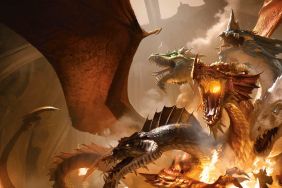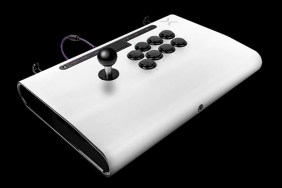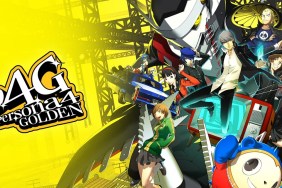Enter the Dragon’s Friends!
One of the things I’ve always missed about the 2D, 16-bit era is the thumb-numbing,
mind blistering speed and action of games like Sonic the Hedgehog and Aladdin
(the Genesis version). While the 32 bit revolution introduced genres that would
have been impossible to emulate on a 16-bit platform, it has lacked some of the
sheer speed and excitement of its predecessor. However, Sony’s Spyro series
has filled all holes in my speed needing soul. Hallelujah.
Having said that, I met Spyro: Year of the Dragon with trepidation.
There have already been two Spyro games, and three times ain’t really
a charm in the world of gaming. I also admit I was afraid that this last Playstation
Spyro would just be a quick addition to an already proven series, whose
sole purpose was to make some quick money off of the previous titles’ successes.
But I was wrong.
Spyro: Year of the Dragon is clearly the product of a talented group
of developers who apparently give a damn about whether or not anyone actually
likes playing their games. And unless there’s something severely wrong with
you, you will certainly like playing this one.
The only aspect of YotD which isn’t very refreshing or interesting
is the story. One night, a Sorceress (who is a total Bowzer knock-off) from
another dimension has her hench-rabbit Bianca go to the dragon realm to steal
all of the dragons’ new eggs (where the eggs came from or why they were there
is never addressed). The only dragon who can fit down the rabbit hole to follow
the bad bunny is Spyro, and so off he goes to collect all 150 stolen
eggs.
Fans of the series will recognize this as a minimal departure from the goal
of the other two Spyro games, both of which involve exploring several huge worlds
and collecting a certain number of items or freeing a certain number of dragons.
But if it ain’t broke, don’t fix it, and the last game
wasn’t broken at all.
This, however, is the one glob of refried beans on the platter of fresh, juicy
meat that is YotD. For one thing, the story that unfolds as you actually
play the game is flawlessly interwoven and quite entertaining. For example,
Bianca’s awkward efforts at being evil and Hunter the Cheetah’s (one of Spyro’s
friends) smitten reactions to them brings the player closer to the characters
and ultimately deeper into the game.
Furthermore, YotD is loaded with hilarious tidbits, such as protecting
an ice-skater named Nancy from a gang of rhinoceros hockey-players while she
practices her routine. While the situation itself is funny enough, watching
a giant rhino slap-shot a pudgy, ice-skating bear would make Dr. Doolittle pee
his pants.
This is also a good example of one of YotD‘s several mini-games. There
are literally tons of em, and they all provide a fresh, new angle on an already
great game. I think every level (about eight levels in every world) has one
or two mini games you can play to try and win an egg, and they cover everything
from boxing to skateboarding to submarine warfare.
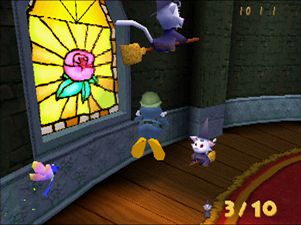 Mini-games
Mini-games
aside, Spyro‘s bare-bones play mechanics are identical to those of the
previous Spyro games. Play usually involves charging around until you
nail your target with your horns, or roasting a big, slow moving enemy with
your flame breath. Spyro‘s head charge has a cheap feel to it, since
you’re usually moving too fast for an enemy to be able to attack you and you
can be pretty sure you’re gonna run into them sooner or later.
However, the head charge is also a little too fast for the camera, which more often than not results in a blind charge, giving consequence to what might otherwise be a cop-out attack.
Spyro‘s play mechanics are diversified by the inclusion of four all
new characters. Along with Spyro, a player gets to control Sheila the Kangaroo,
Sgt. Bird, Bentley the Yeti, and Agent 9 (a space monkey!). All of the characters
have their own moves and limitations, and are all very different from Spyro.
For example, Sheila has a few pretty cool jumping moves and kicks with both
feet when attacking. On the other hand, Sgt. Bird (the world’s only flying penguin)
can hover around and shoot rockets. Not only does this diversify the gameplay,
it also diversifies the levels, as Sgt. Bird and Sheila each have drastically
different levels to suit their drastically different attributes.
In keeping with the rest of the series, YotD‘s visuals overflow with
creativity and intelligent craftsmanship. As opposed to pushing the capabilities
of the PSX, Spyro‘s graphics stay well within the boundaries, resulting
in clean, bright presentation. The colors are vibrant, the backgrounds and characters
are well defined, and the animation is fluid and seamless. Whereas some recent
games have illustrated what exactly the Playstation can’t do graphically,
YotD is a colorful example of what the Playstation can do well:
simple 3D models with clean, polished animations.
The sound is also well done, although not necessarily extraordinary. The background
music sounds identical to every other 3D, cartoony, action platformer I’ve ever
played, and the sound effects are pretty run-of-the-mill. However, the voice
acting is better than usual. All of the little critters you save have distinct
voices. The typically over-dramatized speech fits well with the cartoonish environment
and help to flesh out the characters and their dilemmas.
Spyro: Year of the Dragon is a huge, entertaining game. With over thirty
levels to explore, hundreds of different games to play, and four, brand new
characters (five if you count the special missions for Sparx, Spyro’s dragonfly),
this PSX Spyro finale will gives gamers more than their money’s worth.
While not very difficult, YotD contains enough variety to keep even the
most experienced gamers entertained for a long time. Year of the Dragon indeed.
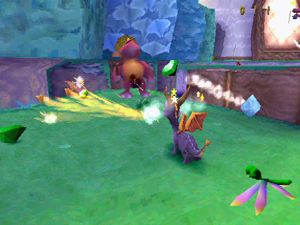
-
Smart, sharp graphics
-
Quick and responsive control
-
Funny, funny, funny
-
More game than you can shake a stick at
-
Still some of the same old, same old








